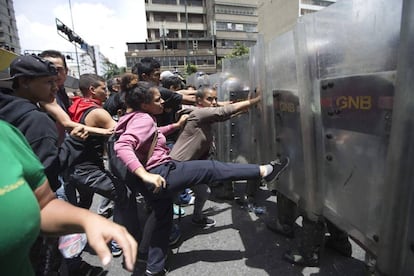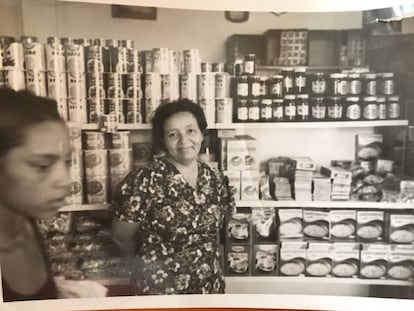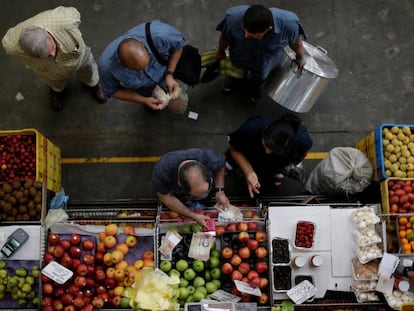With 28,479 killings, Venezuela takes second spot on world murder ranking
Venezuelan Observatory on Violence partly blames economic crisis for soaring crime levels
Homicides and other violent crimes have increased in Venezuela throughout 2016, the Venezuelan Observatory on Violence (OVV) NGO announced on Wednesday, with 28,479 killings over the course of the year, equivalent to 91.8 per 100,000 inhabitants. The organization says the country is now second only to El Salvador as the most violent place in the world where a war is not taking place. El Salvador’s murder rate is 103 per 100,000, while the third-ranked country, according to the NGO, is Honduras, with 59 murders per 100,000.

In February, Venezuela’s state attorney, Luisa Ortega Díaz, put the country’s murder rate at 58.1 for every 100,000 inhabitants. Roberto Briceño León, head of the OVV, said on Wednesday that his organization had based its figures on regional observatories, press reports, primary data from public officials working in the justice system, and other “scientific” sources.
Briceño admitted that his organization’s figures could be under- or over-estimated, and that of the total number of violent deaths, 18,230 were recorded by the justice system, 4,968 were the result of bullet wounds and were registered as “investigations,” while 5,281 involved resistance to the authorities.
Barely nine people are detained for every 100 murders, says the OVV
The OVV estimates that Caracas is 14 times more violent than Sao Paulo in Brazil, 10 times more so than Bogota, the capital of Colombia, and 15 times more so than Mexico City.
The OVV’s report says that there are up to four killings each week in the country involving more than three victims. It adds that there has been a sharp increase in crimes related to hunger, with those responsible looking for food.
It adds that the violence has escalated this year through the use of high-caliber weapons by both police and criminals. Briceño attributes this process to “the destruction of institutions and the rules of the game,” by the government of President Nicolás Maduro. “The partisanship of the justice system, attempts to control legislative power [by the majority opposition], and the blocking of electoral mechanisms have created tension in society,” he said.
At the same time, added Briceño, there was a “generalized impoverishment of society,” a lack of foodstuffs, and deficient basic services, all of which increased unrest and violence in 2016. As a result, said the OVV, there were at least 120 lynchings, along with paid killings at the rate of up to four a week.
Violence has escalated through the use of high-caliber weapons by police and criminals
Briceño León says that these factors have created a climate of fear that has prompted many people not to leave their homes after dark, while shopkeepers often close their premises early to avoid robberies or looting.
At the same time, the violence has led growing numbers of people, many of them the children or grandchildren of immigrants, to emigrate, with Spain, Colombia and Italy the main destinations.
The OVV added that this year had also seen an increase in the numbers of police resigning due to “victimization,” low salaries and lack of protection from criminals, who it says enjoy increasing impunity.
Finally, Briceño noted that barely nine people are detained for every 100 murders and that the “deterioration” of the penal system has led to thousands of prisoners being held in police stations despite orders to transfer them to jails.
English version by Nick Lyne.









































